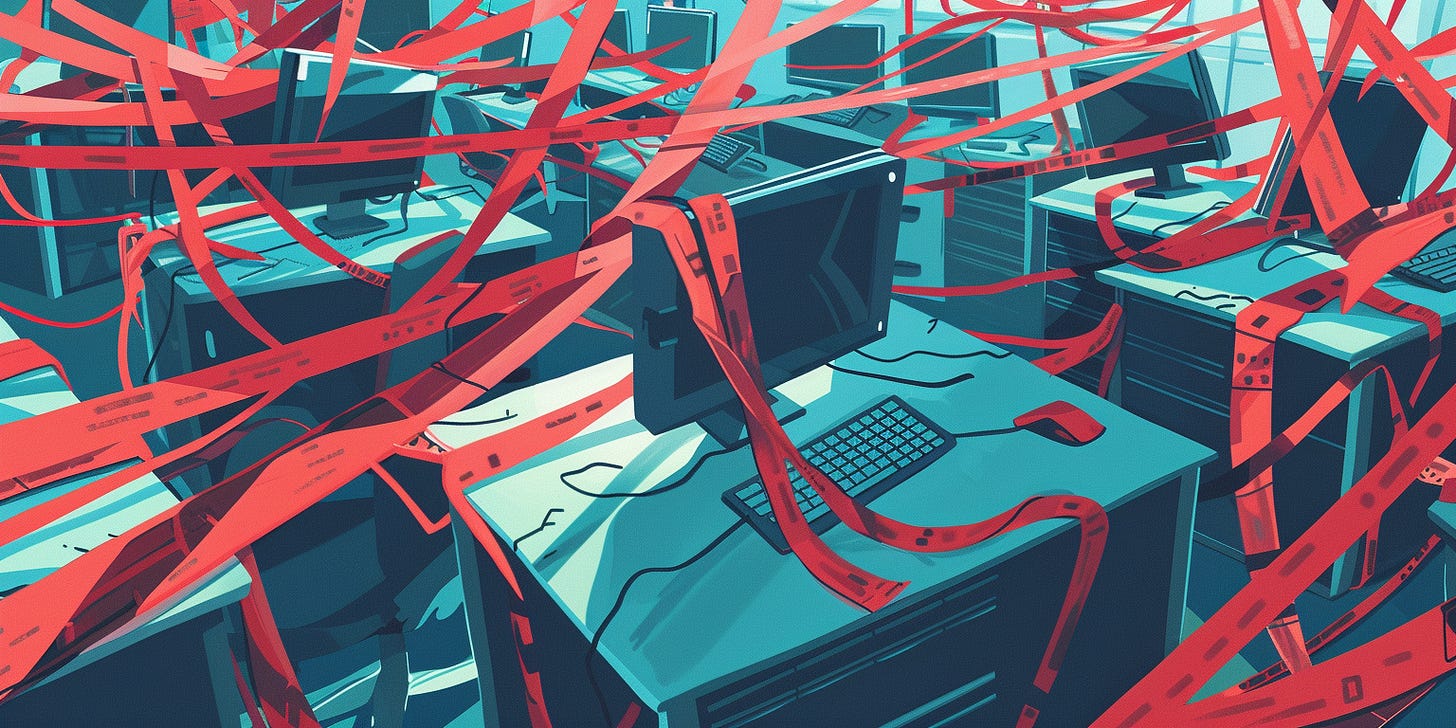510: EU Theft?, AI Datacenters & Energy Bottlenecks, Elon Musk Drops Oracle, GPU Smuggling, Meta Threads, and Dark Matter
"dirty rotten liars"
Intelligence is what you use when you don’t know what to do.
—Jean Piaget
🆓📦🤬😤😡 Here’s one of my papercuts lately.
Trying to give stuff away can be very frustrating!
You’d think people would be happy to get something they want gratis. But you almost have to get on their case like a debt collector to get them to actually come and pick up the item.
My wife and I have been getting rid of things we don’t need — furniture, kid stuff, appliances, etc — by listing them on the local ‘Buy Nothing’ group on Facebook. The vast majority of the time, the people who claim to want the things turn out to be dirty rotten liars with no respect for other people’s time.
“I’ll come pick it up today at 11 AM”
“I got delayed at work, I’ll pick it up tonight at 4 PM.”
“I’m on my way”
“I’ll pick it up tomorrow instead…”
“Ok, for sure the next day for sure”
Rinse and repeat…
It usually ends with us either getting ghosted or so tired of the BS that we tell them to forget it. Then we have to play that game again with the next person on the list. 🙄
Part of it is no doubt the “free paradox”:
- Offering items for free can paradoxically make them seem less valuable to potential recipients. This can lead to a lack of commitment from interested parties and result in no-shows or last-minute cancellations.
Attracting "choosing beggars":
- Free listings tend to attract people who may be overly demanding or have unrealistic expectations, often referred to as "choosing beggars". These individuals may ask for delivery, additional items, or make other unreasonable requests.Maybe we’re making a rookie mistake 🤔
A rational solution from behavioral economics would be to put a nominal price on things. But that would prevent you from listing on the ‘Buy Nothing’ local groups and it’s not like selling things is always smooth and low-friction either.
Maybe we’ll start selling stuff for $5 and see if that makes a noticeable difference. To be continued…
🤫🤖🔊 TIL if you whisper to an Amazon Echo, Alexa will whisper back.
🏛️⚔️ The Gallic Wars series on Caesar’s “masterwork of psychology, strategy, and propaganda” continues. Part 2 is out and I really enjoyed it.
🛒 🚚 📦After over 20 years of buying stuff on Amazon, I still like pressing the ‘buy’ button and I still get a small bit of joy when I see a package on my doorstep.
⚓️🚢🗓️🏆🎖️🛣️ There are now two Hobarts on this steamboat!
I define a ‘Hobart’ as ‘12,000 subs’ because when I started this thing in July 2020, I saw Byrne Hobart (💚💚💚💚💚 🥃) mention that the excellent The Diff had 12k subs.
That seemed like an impossibly high number but I set the aspirational goal of someday reaching a Hobart.
I can’t believe we’re at two!
Thanks for being here, it warms the cockles of my heart ❤️🔥
💚 🥃 🚢⚓️ If you’re getting value from this newsletter, it would mean the world to me if you become a supporter to help me to keep writing it.
You’ll get access to paid editions, the private Discord, and get invited to the next supporter-only Zoom Q&As with me.
If you only get one good idea per year, it’ll more than pay for itself. If it makes you curious about new things, that’s priceless.
🏦 💰 Liberty Capital 💳 💴
🇪🇺🫳🏦 E.U.: ‘Crossing the line from regulation to theft’?
Ben Thompson (💚 🥃 🎩) and I have been thinking about similar things lately. He published a very thought-provoking piece, “The E.U. Goes Too Far”, which I recommend reading (or listening to in the podcast version, as I did).
It serves as a kind of follow-up to what I wrote last week in Edition #509:
While some of Ben’s points are similar to mine, he also highlights how the EU is crossing the line from regulation into confiscation.
On the EU vs Google (I added the bold):
the reason I reacted so negatively to this decision, though, was because this specific point struck me as being fundamentally anti-free market: Google was obligated to deliver a search experience on the European Commission’s terms or else.
On the EU vs Apple:
It sure seems that this is the exact scenario that the European Commission is headed towards: demanding that Apple make its intellectual property available to third party developers on an ongoing basis without charge; again, while I think that Apple should probably do that anyways, particularly for apps that eschew the App Store entirely, I am fundamentally opposed to compelling a company to provide its services for free.
On the EU vs Meta:
personalized ads are so valuable that Eric Seufert has estimated that charging a subscription in lieu of personalized ads would cost Meta 60% of its E.U. revenue; being forced to offer completely un-personalized ads would be far more injurious.
Clearly, though, the European Commission doesn’t care about Meta or its rights to offer its products on terms it chooses: demanding a specific business model that is far less profitable (and again, a worse user experience!) is once again a de facto nationalization (continentalization?) of private property.
And, as a variation on an earlier point, while I don’t agree with the demonization of personalized ads, I do recognize the European Union’s prerogative and authority to insist that Meta offer an alternative; what is problematic here is seeking to ban the fairest alternative — direct payment by consumers — and thus effectively taking Meta’s property.
On the EU vs Nvidia:
European regulators don’t seem to care about incentivizing innovation, and are walking down a path that seems likely to lead to de facto continentalization of private property: the logical penalty for Nvidia’s crime of investing in CUDA could very well be the forced separation of CUDA from Nvidia chips, which is to say simply taking away Nvidia’s property; the more “moderate” punishment could be ten percent of Nvidia’s worldwide revenue, despite the fact that France — and almost certainly the E.U. as a whole — provide nowhere close to ten percent of Nvidia’s revenue.
Looking at this situation, I was reminded of the old quip by Willie Sutton, a bank robber from the early 20th century:
"Why did you rob the bank?"
"Because that's where the money is!" ¯\_(ツ)_/¯ These fees/penalties/taxes/settlements/etc are a de facto way to get an extra ‘royalty’ on US innovation (and they need it these days).
Europe is an ally and trading partner of the US, but lately they aren’t acting very friendly and are setting a bad precedent — what happens when India, Brazil, Indonesia, Turkey, Japan, Vietnam, etc, also decide that they want a slice of the juicy, juicy Big Tech pie? 🥧💰
What happens when they each start trying to dictate design changes to products and services? It’s already challenging enough to try to follow every law in every country — many of which want certain things censored — but it’s a whole other thing when every legislator feels like they should be involved in product design and/or business model decisions (of course, all these regulations will be incompatible with one another from one country to the next)…
Back to Ben:
The first thing to note is that the very existence of these threats should be considered outrageous by the U.S. government: another international entity is threatening to not just regulate U.S. companies within their borders (reasonable!), but to actually take revenue earned elsewhere in the world. [...]
In short, the E.U. either has or is about to cross a critical line in terms of overplaying its hand: yes, most of tech may have been annoyed by their regulations, but the economic value of having one code base for the entire world meant that everyone put up with it (including users outside of the E.U.); once that code base splits, though — as it recently did for Apple — the calculations of whether or not to even serve E.U. users becomes that much closer; dramatically increasing potential fines far beyond what the region is worth only exacerbates the issue. [...]
I might disagree with a lot of E.U. regulations, but I respect them and their right to make them; dictating business models or forcing a company to provide services for free, though, crosses the line from regulation to theft.
I love this ending: 🚀
Here’s the problem with leading the world in regulation: you can only regulate what is built, and the E.U. doesn’t build anything pertinent to technology. [...]
Or, to use Breton’s description, a launchpad without a rocket is just a burned out piece of concrete.
That’s great writing.
👎 Elon Musk’s xAI Drops Oracle $10bn Deal, will Build GPU Cluster Itself 👷♂️🏗️🤖🤖🤖
The DIY attitude is still alive with Musk:
Musk’s xAI and Oracle have ended talks to expand an existing arrangement under which xAI rents specialized Nvidia AI chips from the tech giant.
Instead, xAI is buying chips to build a data center on its own, according to several people involved in the talks. [...]
Now Musk’s firm will build its own artificial intelligence data center in Memphis, Tenn., with Nvidia chips supplied by Dell and Supermicro.
That’s gotta hurt for Oracle… The two were recently reported to be negotiating a HUGE multi-year $10bn deal.
the talks stalled over issues including Musk’s demand that the supercomputer be built faster than Oracle thought possible, and Oracle’s concern that xAI’s preferred location did not have access to an adequate power supply
Having read two biographies of Musk, this sounds very familiar.
People tell him: “It’ll take X amount of time and cost Y”
Musk: “No, I want it done in 1/4 of X and for half of Y”
“That’s impossible!”
“Fine, I’ll do it myself…”
Musk Tweeted this about the situation:
xAI contracted for 24k H100s from Oracle and Grok 2 trained on those. Grok 2 is going through finetuning and bug fixes. Probably ready to release next month.
xAI is building the 100k H100 system itself for fastest time to completion. Aiming to begin training later this month. It will be the most powerful training cluster in the world by a large margin.
The reason we decided to do the 100k H100 and next major system internally was that our fundamental competitiveness depends on being faster than any other AI company. This is the only way to catch up.
Oracle is a great company and there is another company that shows promise also involved in that OpenAI GB200 cluster, but, when our fate depends on being the fastest by far, we must have our own hands on the steering wheel, rather than be a backseat driver.Those 24k H100s are a pretty good consolation prize for Oracle, I suppose.
🪡🧵 Meta’s Threads: One Year Later, 175 Million Users
Despite all the early obituaries last year, Twitter is still alive 🐦
But over the past year, Threads has grown into a kind of parallel universe. Zuck recently tweeted, er, threaded:
Threads now has more than 175M monthly actives. What a year.I’ve been seeing Threads promoted a lot more on Instagram lately, which is probably their main funnel for new users. The question is: Do these users stick around, post good content, and make friends, or are they churning quickly?
Adam Mosseri, thread’s boss, gave an interview to Casey Newton about it.
I don’t have too much to add, other than it seems like certain communities have mostly left Twitter and found a new home on Threads (or maybe Mastodon), like a lot of Techtwitter and Appletwitter, but Fintwit has pretty much stuck with the old bird.
I try to keep an eye on Threads and find interesting people to follow there, but my usage is still pretty much 95% Twitter. It’s a real case study in the power of the network effect!
🏴☠️🇨🇳🤖 GPU Smuggling to China, Here We Go Again Edition
I’ve written a bunch about this, so I’ll skip the context and jump straight to it:
A 26-year-old Chinese student in Singapore was packing suitcases last fall to return home for vacation. Besides his clothes and shoes, his luggage included six of Nvidia’s advanced artificial-intelligence chips.
A connection from college asked him to bring the chips because the U.S. restricted their export to China. Each chip was roughly the size of a Nintendo Switch game console, and the student didn’t flag any suspicions at the airport.
Upon arrival, the student said he was paid $100 for each chip he carried, a fraction of the underground market worth. [...]
Many foreign governments and jurisdictions aren’t legally required to impose the U.S. controls, and such chip sales to China aren’t generally considered a criminal offense in those places, according to international trade lawyers.
For instance, the student transporting the Nvidia chips didn’t break any Singaporean laws (Source)
The Center for Strategic and International Studies (CSIS) wrote a report on chip smuggling, if you want more detail.
this report proposes that the U.S. government secure the initial sales of chips through a certification program for chip distributors and mandate the use of preapproved logistics providers, tagged at the point of sale, to inoculate against the risk of illicit diversion when exiting a port.
Tim Fist of the Institute for Progress estimates that there are more than 100,000 ‘banned’ GPUs smuggled to China per year. I don’t think this includes GPUs outside of China used by Chinese firms and government entities in the cloud. ☁️
🧪🔬 Liberty Labs 🧬 🔭
🇿🇦 South African Nuclear Power Set for Major Expansion ⚛️
South Africa’s energy ministry plans to secure funding approval soon for a 2,500-megawatt nuclear power plant in its efforts to increase electricity supplies, the local Sunday Times reported.
Work has reached an advanced stage, and a team is working on a deal and finalizing the procurement structure for the project, Energy and Electricity Minister Kgosientsho Ramokgopa told the Johannesburg newspaper.
This would be their second nuclear power plant:
The proposed power station would be bigger than the Koeberg plant, north of Cape Town, which is South Africa’s only nuclear power plant and generates 1,940MW of energy.
That plant was commissioned in 1984-1985 and is owned and operated by Eskom, the state utility company.
It provides about 5% of South Africa's total electricity production.
The country doesn’t have enough power. Rolling power cuts can lead to daily outages of up to 10 hours! “The nation’s energy crisis has hurt economic activity and in 2023 resulted in GDP growth of just 0.7%, the slowest rate of expansion since the pandemic in 2020.”
⚡️Energy is the foundation of civilization.⚡️
Like oxygen, when it’s plentiful, we take energy for granted and forget about it, but as soon as there’s too little of it, it becomes the only thing that matters.
What I want to see our civilization do is make our energy systems more robust to protect the downside, and grow generation so that there is energy abundance.
We know how to do it — nuclear, solar+batteries, hydro, deep enhanced geothermal, wind — we just have to build. And to do that, we have to streamline the red tape that makes everything take so long and be so expensive.
There’s a huge backlog to build the transmission lines that are necessary to modernize the U.S. grid… We need to do some systems thinking, find bottlenecks, and remove them one by one.
It’s misguided to think that these regulations are protecting the environment — by making it impossible to build, they protect whatever already exists (coal plants, gas plants, internal combustion engines, gas furnaces) against what we’d like to build instead (solar, nuclear, EVs, heat pumps).
‘How to Build an AI Data Center’ 🤔
Speaking of building data centers full of GPUs AND building power plants, Brian Potter has a great post about what is involved. The whole thing is worth reading, but here are a few highlights:
But even as demand for capacity skyrockets, building more data centers is likely to become increasingly difficult. In particular, operating a data center requires large amounts of electricity, and available power is fast becoming the binding constraint on data center construction. [...]
The downstream effects of losing the race to lead AI are worth considering. If the rapid progress seen over the last few years continues, advanced AI systems could massively accelerate scientific and technological progress and economic growth. Powerful AI systems could also be highly important to national security, enabling new kinds of offensive and defensive technologies. Losing the bleeding edge on AI progress would seriously weaken our national security capabilities, and our ability to shape the future more broadly. And another transformative technology largely invented and developed in America would be lost to foreign competitors.
Back to how long it takes to build things:
In the U.S., the problem is made worse by difficulties in building new electrical infrastructure. Utilities are building historically low amounts of transmission lines, and long interconnection queues are delaying new sources of generation.
Data centers can be especially challenging from a utility perspective because their demand is more or less constant, providing fewer opportunities for load shifting and creating more demand for firm power.
Data centers will have to evolve:
Because current data centers aren’t necessarily well-suited for AI workloads, AI demand will likely result in data centers designed specifically for AI.
Expect things like liquid-cooling to become more common (as opposed to air cooling).
🎨 🎭 Liberty Studio 👩🎨 🎥
👍👍 ‘Dark Matter’ (2024 on Apple TV+) 📦
I’ll keep this spoiler-free because my goal is to convince you to check it out if you haven’t seen it.
This show is like a staircase: The first 3 episodes are good, the middle 3 are quite good, and the last 3 are very strong.
It’s not perfect, but all the departments are doing good work: The acting, directing, writing, music, cinematography, etc.
Some of the visual effects aren’t the best, but most of the show still looks better than a Marvel film (isn’t it sad that this is now the reference for a “cheap, boring look”?).
It made me want to re-read the book, both because it was a reminder of how fun it was, but also because I want to refresh my memory and better compare and contrast the changes that were made by the author when he wrote the screenplay.
Overall, I think the changes were good and either added to the story, or made it work better in this visual medium and wouldn’t work as well in the book.
Even if you’ve read the book, there will be some surprises for you!











Your comments about the EU explain why the British voted for Brexit. The EU is over bearing and technocratic. Pedro Domingos made an interesting observation: 'America innovates, China replicates, Europe regulates.'
I don’t have Facebook, but can you list things in ‘Buy Nothing’ as “$X or free if you pick it up”?